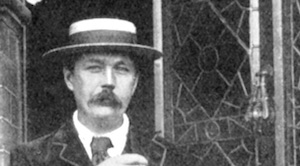Conan Doyle's Through the Magic Door
- THEODORE DALRYMPLE
When Dr Watson first describes the character of Sherlock Holmes, he presents the man who is soon to become his friend as a complete philistine where literature and philosophy are concerned.
 Arthur Conan Doyle
Arthur Conan Doyle1859-1930
The detective is not an ignoramus, exactly, for he has at his disposal a wide range of arcana: but his islands of knowledge form an archipelago, not a continent.
The creator of the greatest detective who never lived, Arthur Conan Doyle, was about as far removed from being a bohemian intellectual as can be imagined. He was a keen sportsman and practical joker; he was an admirer of prize fighting and its practitioners; in his early days he was an adventurer. He is often presented as a bluff and hearty man of no great intellectual attainments. But a man does not become a great prose stylist (as Conan Doyle was) by chance; the doctor-author was a very well-read man.
In 1907, he published a book, Through the Magic Door: the magic door is that to his book-lined study, of which the frontispiece is a photograph. The text is a paean to reading, and a brief account of the books that had meant most to him.
He describes how, in his medical student days in Edinburgh, he had exactly thruppence (1.25 new pence) for his lunch, but that his way to his afternoon classes was past a bookshop which kept a tub of books for thruppence outside, and "a combat ever raged betwixt the hunger of a youthful body and that of an inquiring and omnivorous mind." At least once a week the life of the mind prevailed over the life of the body, and he bought old leather-covered volumes of classics such as Clarendon, Addison and Swift.
By today's standards, Conan Doyle was prodigiously well-read, both in English and French. He makes remarks that, more than a hundred years later, retain their accuracy. Lamenting the decline of music in England since the time of Pepys, Conan Doyle says, "In England, alas, the sound of a poor man's voice raised in song means only too surely that he is drunk." On reading this, I could not but think of my embarrassment when, abroad, I have been asked to sing an English song or, worse still, perform an English dance.
In another aside, Conan Doyle laments the passing of stoicism and the stiff upper lip:
The Gentleman should always be the Stoic, with his soul too great to be affected by the small troubles of life. "You look cold, sir," said an English sympathizer to a French emigré. The fallen noble drew himself up in his threadbare coat. "Sir," said he, "a gentleman is never cold."
Conan Doyle would not approve, to put it no stronger, of our propensity to complain:
One's consideration for others as well as one's own self-respect should check the grumble . . . The man who must hop because his shin is hacked, or wring his hand because his knuckles are bruised should be made to feel that he is an object not of pity but of contempt.
Instead, we now have websites telling us how to complain and informing us that to complain is our right (though not, of course, that it is also big business, carried on at our expense). It is all enough to make a stoic . . . well, complain.
 This is Meaghen Gonzalez, Editor of CERC. I hope you appreciated this piece. We curate these articles especially for believers like you.
This is Meaghen Gonzalez, Editor of CERC. I hope you appreciated this piece. We curate these articles especially for believers like you.
Please show your appreciation by making a $3 donation. CERC is entirely reader supported.

Acknowledgement
 Theodore Dalrymple. "Conan Doyle's Through the Magic Door." The Skeptical Doctor (June 26, 2013).
Theodore Dalrymple. "Conan Doyle's Through the Magic Door." The Skeptical Doctor (June 26, 2013).
Reprinted with permission of The Skeptical Doctor.
The Author

 Theodore Dalrymple is a former psychiatrist and prison doctor. He lives in France and is the author of, The Terror of Existence: From Ecclesiastes to Theatre of the Absurd, The Proper Procedure and Other Stories, Out Into The Beautiful World, Admirable Evasions: How Psychology Undermines Morality, Spoilt Rotten: The Toxic Cult of Sentimentality, Farewell Fear, Our Culture, What's Left of It: The Mandarins and the Masses, Life at the Bottom: The Worldview That Makes the Underclass, and So Little Done.
Theodore Dalrymple is a former psychiatrist and prison doctor. He lives in France and is the author of, The Terror of Existence: From Ecclesiastes to Theatre of the Absurd, The Proper Procedure and Other Stories, Out Into The Beautiful World, Admirable Evasions: How Psychology Undermines Morality, Spoilt Rotten: The Toxic Cult of Sentimentality, Farewell Fear, Our Culture, What's Left of It: The Mandarins and the Masses, Life at the Bottom: The Worldview That Makes the Underclass, and So Little Done.




